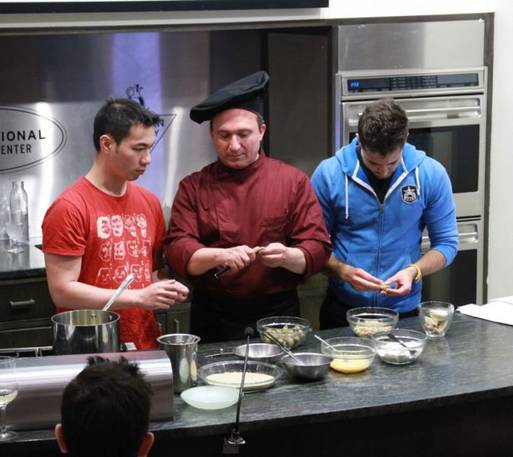


Previously on i-Italy we have discussed the beauty of Le Marche [2], the “calf” of Italy, located just two hours from Rome and facing the Adriatic Sea.
The Region is the only one in the country to have a plural name: derived from the German word “Marks,” or borderlands, the name testifies to the richness and variety of the Region, which results from grouping different independent Marches into one land.
Each of the Provinces that constitute the Region today are very active in promoting themselves independently, as each of them is characterized by its own landscapes, traditions and specialty products, each of which deserve historical and cultural explanations to be fully understood.
Over the last few days, New York has had an interesting taste of the peculiarities of the Ascoli Piceno Province.
A delegation of representatives from the territory, led by Piceno enthusiast and renowned food historian Francine Segan [3], who fell in love with the area after visiting it last November, took over the city with their spontaneity and friendliness, with several glasses of fine wines and massive quantities of “olive ascolane” (a delicious meal starter made with pitted Tenera Ascolana olives, stuffed with slow simmered, seasoned beaf, chicken and pork meats, crumbed and fried).
In a series of delightful tasting events, Segan introduced New Yorkers to the history and the culture of the Piceno area, while describing the charms of the region, which features a breathtaking Riviera, hilly inlands characterized by vineyards, wineries and mountains, the Sibillinis, all within reach with a 30 minutes drive from east to west.
Over the past few days, i-Italy attended two important events promoting the Piceno area in New York.
The first event was held on April 17 at the 92Y [4] Cultural Center in Manhattan’s Upper East Side, where wines from the Piceno Wines Consortium [5] were offered with olive ascolane and other delicacies cooked on the spot by Chef Emilio Pasqualini from Cantina del Picchio [6] Restaurant in Offida. Pasqualini was specifically flown in for the occasion, and used Segan’s nearby apartment as a base for cooking and frying.
Piero Celani [7], President of the Ascoli Piceno Province and former Mayor of Ascoli Piceno for 10 years, was at 92Y to welcome the guests and tell more about the Piceno area. He started out his speech by using a provocation: “How many of you know that Ascoli Piceno is older than Rome?”
Not many people in the room knew, and many even had trouble locating Le Marche on Italy’s map. “So far, we have kept our land’s secrets to ourselves. We were so satisfied with what we have that we didn’t feel the need to share it,” Celani told i-Italy.
The President elaborated on how this tendency is being reversed: “We have a gap to bridge, but our margins of improvement are extremely high: what is typically considered as ‘Minor Italy,’ the less known parts of our country, have no less culture, history and traditions than the big cities of art.”
Celani really believes that the experience of the territory for American visitors, “who value a high quality of life,” will be key to give new life to tourism in Italy as a whole: “We want to organize an incoming from New York to Ascoli in October. We want Americans to experience the high quality of life we can offer. That is going to benefit our area as well as the whole ‘sistema Italia’,” he said.
The second event i-Italy attended was held on April 19 at the International Culinary Center [8], where Chef Pasqualini offered a cooking lesson to the students of the Center’s renowned school.
He prepared “pizza al formaggio,” a typical cheese bread from the area that is the perfect match for the indigenous passerina and pecorino wines, and unveiled the techniques to obtain the perfect olive ascolane (each olive must be hand pitted by cutting the pulp off the pit in a spiral form, then their shape has to be recomposed by inserting a tiny meatball in it, and patting each of them individually for ten times before dipping it in egg and crumbing it).
Bringing the flavors and the recipes of their land to New York was fundamental to communicate the reality of the Piceno area, Giovanni Vagnoni from Le Caniette [9] winery tells i-Italy: “What we did here in New York has to do with the culture of our land.”
Vagnoni, Vice-President of the Piceno Wines Consortium, has been selling his wines in the US for over 15 years, but the products alone can’t do justice to a region so full of tradition: “It’s hard to communicate the Italian lifestyle, it’s better to make it an experience through emotions and flavors. These are definitely tomorrow’s means of communication.”
When considering Segan’s love and appreciation for the Picenos and their land, Vagnoni is proven correct: “Francine was bewitched by our region and by our people: we are gentlemen from the country, and we recommend you visit us to understand our land. Those who come always leave a piece of heart with us.”
Source URL: http://ftp.iitaly.org/magazine/dining-in-out/articles-reviews/article/piceno-best-kept-secret-le-marche-region-unveiled-in
Links
[1] http://ftp.iitaly.org/files/img24481335225594jpg
[2] http://en.turismo.marche.it/
[3] http://www.francinesegan.com
[4] http://www.92y.org
[5] http://www.picenos.com
[6] http://maps.google.com/maps/place?rlz=1C1SKPC_enIT415IT419&um=1&ie=UTF-8&q=cantina+del+picchio+offida&fb=1&gl=us&hq=cantina+del+picchio+offida&cid=13131086422534651263
[7] http://www.provincia.ap.it/provincia/presidente.asp
[8] http://www.internationalculinarycenter.com
[9] http://www.lecaniette.it